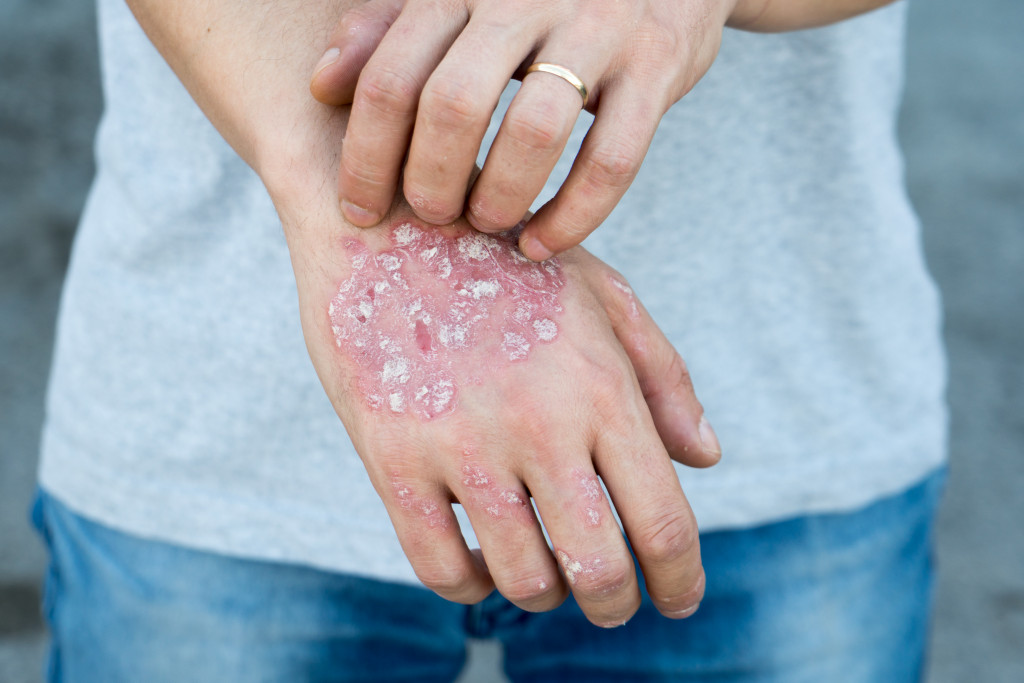Psoriatic arthritis is a type of inflammatory arthritis that affects people with psoriasis. It is estimated that 7-26% of those with psoriasis will develop psoriatic arthritis as well. Here’s a break of what psoriatic arthritis is and how it can be managed.
What are the Symptoms of Psoriatic Arthritis?
Psoriatic arthritis symptoms vary from person to person but typically include pain, swelling, stiffness, and tenderness in the joints. This condition most commonly affects the fingers and toes, wrists, elbows, ankles, and knees. Sometimes, it can even include jaw and tooth pain, leading to tooth loss. In some cases, people with psoriatic arthritis may also experience fatigue or swollen fingers or toes that look like sausages—a condition known as dactylitis. Sometimes these symptoms can cause difficulty walking or climbing stairs due to joint pain or stiffness.
Risk Factors
Various factors can cause this kind of arthritis. Here are some of them:
Genetics
Genetic predisposition affects who gets psoriatic arthritis and who doesn’t. For example, if you have a family history of psoriasis or any other autoimmune disorder, then you are more likely to develop psoriasis, which puts you at greater risk of developing psoriatic arthritis as well. A decent chunk of people with psoriasis will develop psoriatic arthritis within ten years.
Age and Gender
Psoriatic arthritis can affect anyone at any age, although it typically begins between 30-50 years old. However, it appears more commonly in women than in men between 18-45 years old and is more likely severe in women than in men.
Environmental Triggers
Specific environmental triggers may also increase your chances of developing psoriasis or exacerbate existing cases. This includes excessive alcohol consumption, smoking, stress, skin injuries such as cuts or scrapes, infections such as strep throat or upper respiratory infections, certain medications like anti-malarial drugs or beta blockers, cold weather conditions (especially during winter months), and even trauma from surgery or physical injury sites. All these environmental triggers can cause an immune response that triggers inflammation related to psoriasis and psoriatic arthritis symptoms.

Diagnosis and Treatment Options
If you think you may have psoriatic arthritis, you must see your doctor immediately for an accurate diagnosis. Your doctor will likely perform a physical exam to check for signs of inflammation in your joints and muscles and ask about your family history of psoriasis or other autoimmune conditions. They may also order blood tests or X-rays to rule out other potential causes of joint pain and swelling. Thankfully, there are various ways to treat this kind of arthritis. Here are some of them:
Replacing Teeth
First, you must address any oral problems you might have with this disease. Replacing tooth loss caused by this disease is crucial for your overall health. A robust fake tooth can help restore oral health and prevent future complications. This tooth is usually made from a dental implant placed in the jawbone and acts as an artificial tooth root.
Medication
Medication is often used as a first defense in treating psoriatic arthritis. Nonsteroidal anti-inflammatory drugs (NSAIDs) may be prescribed to reduce inflammation and pain in affected joints; however, long-term use may be associated with side effects like stomach upset or ulcers. Therefore, other medications, such as corticosteroids or biologics, may be recommended if NSAIDs don’t offer enough relief or if there is a risk of severe infection due to prolonged use.
Lifestyle Changes
Making changes to your diet and lifestyle can also help ease the symptoms of psoriatic arthritis. For example, eating an anti-inflammatory diet filled with fruits, vegetables, healthy fats (such as olive oil), and lean proteins can help reduce inflammation. Getting enough restful sleep is also vital for managing pain levels; try setting up good sleep habits, such as avoiding caffeine late in the day or establishing a calming nighttime routine before bedtime to ensure quality rest each night. Additionally, engaging in low-impact activities such as swimming or yoga (which can help strengthen muscles without putting too much strain on joints) can also help relieve some of your symptoms.
Psoriatic arthritis is an inflammatory condition that affects those with psoriasis. While its symptoms can vary from person to person, they typically involve joint pain, stiffness, and swelling in specific areas such as the hands or feet. If you think you may have this condition, you must speak with your doctor immediately so they can accurately diagnose you and begin treatment if necessary. With proper management through lifestyle changes, medications, or physical therapy, those living with psoriatic arthritis can still lead full lives despite their condition!


